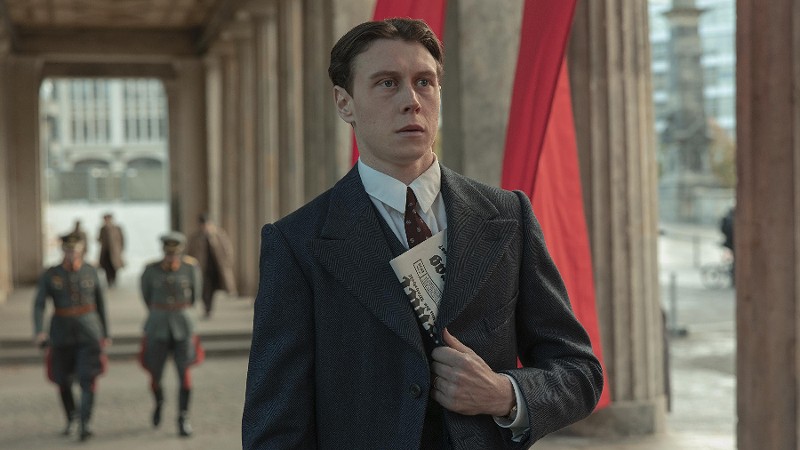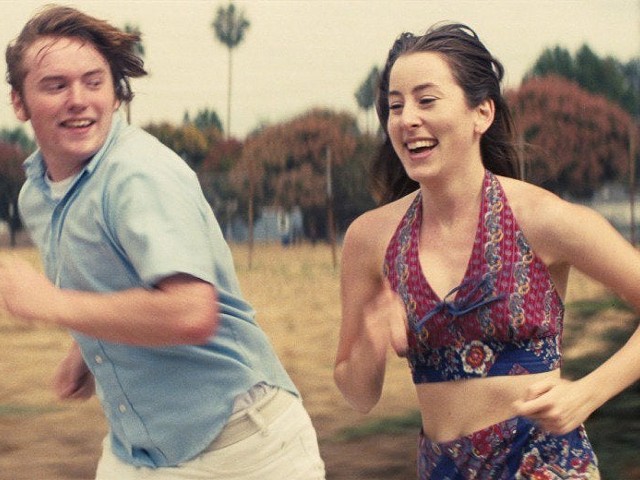Espionage Meets Surprising Bromance in Munich: The Edge of War
[
{
"name": "GPT - Leaderboard - Inline - Content",
"component": "41932919",
"insertPoint": "5th",
"startingPoint": "3",
"requiredCountToDisplay": "3",
"maxInsertions": 100
}
]
“He’s not changing his mind,” Neville Chamberlain (Jeremy Irons) reports laconically between prim puffs on his morning cigar, reading confirmation of Adolf Hitler’s plan to invade Czechoslovakia. It is a hilarious moment in a film that in topic and tone could not be more serious; Europe is on the brink of a second world war, and the prime minister remains entirely nonplussed. It is also in keeping with an English sense of humor as dry as the toast that Chamberlain butters during his visit with “Herr Hitler” during the fateful 1938 Munich Conference, a diplomatic meet-cute between European powers that ostensibly bought the British empire an extra year to prepare for battle.
But did prioritizing talk over action, propriety over taking a stand, actually pay off? Munich: The Edge of War hints at the possibility, while equally indicting Britain’s early geopolitical effeteness. Based on the novel by Robert Harris, and the first primarily English-language feature of German director Christian Schwochow, the film is a gripping, often moving political thriller that shirks the pro-Allied nostalgia woefully present in typical Hollywood takes on World War II. The fact that Americans had little to do with the making of the film — and do not appear in it — may be why it offers a more nuanced portrait of a time so often reduced to good versus evil.
Toggling between the early and late 1930s, between the posh hubs of London and Oxford and the grittier, politically reeling strassen of Munich and Berlin, the movie chronicles the friendship of Hugh Leget (George MacKay) and Paul von Hartmann (Jannis Niewöhner), two young men who meet at Oxford only to reconnect as representatives of their rival governments six years later. Even more so than in the Bourne series and more recent installments of the Bond franchise, European stars outshine globally famous A-listers, especially in the case of Niewöhner, Liv Lisa Fries and Sandra Hüller, the latter two actors playing Lena and Helen Winter, Paul’s college and adult love interests, respectively. Hugh is tepidly married, with a young son, while Paul has joined the German resistance plotting to stop Hitler by whatever means possible. Their paths intersect when Helen grants Paul access to an official document detailing Hitler’s plans of uninhibited conquest, confirming his status as a madman to anyone wary of mass carnage. “You need to find a way to meet Chamberlain,” she implores Paul. “You have to prevent this agreement from being made.”
If, on one level, Irons’ stuffy Chamberlain comes across as an unlikely champion for peace, the real heroes of the film are clearly Hugh and Paul, who risk their reputations, if not lives, to warn the Brits of Hitler’s objectives. “You have no idea who he is,” Paul entreats his skittish friend upon meeting in Munich. “If you did, none of you would be here.” While their friendship never overtly shifts into something more, Hugh and Paul (and MacKay and Niewöhner) share an unmistakable chemistry that could spark a thousand offscreen fantasies. Whether splitting a cigarette or plotting espionage over pints of lager, their eye contact never wavers, and teasing often veers flirtatious. “You’re turning gray,” Hugh points out across a bierhaus table. “And you still don’t need to shave,” Paul observes.
While surely peripheral characters to the central narrative, women in the film play an active role in how it evolves, revealing themselves to be complex figures in their own right, at once patriotic and morally ambivalent about the prospect of war. “People are leaving the country,” Lena admonishes a naïve Paul in a flashback set in 1932. “Families are getting on boats to America”. The cancerous spread of anti-Semitism in early ‘30s Germany is likewise handled with refreshing deft. Despite his anti-Hitler sentiments, Paul quickens his pace when passing a trio of Jewish Berliners forced to scrub the terrace of the local kino; he may be ruffled but he’s not looking back, let alone intervening.
If interpreted as an apologia for Chamberlain’s stodgy lack of aggression against a megalomaniac leader, Munich: The Edge of War might reasonably strike some as out of touch if not dangerously revisionist. But as an exploration of the flawed assumptions — and outright failures — of Hitler’s British and German foes, it resonates as a fictional, yet often plausible, account of what could have happened had history gone differently. “The great characteristic of the English is distance. Not only from one another, but feeling,” jests Paul in the opening scene at a party at Oxford. “We are nothing but feeling. There’s a new age beginning in the new Germany. You can look forward to that.” When ardor is met with diffidence, or worse, evil met with eager attempts at appeasement, what can go tragically wrong? The question is worth asking not only in considering Adolf Hitler, but the rise of any thuggish leader on whom acts of diplomacy make no impression.
“We don't choose the times we live in,” Paul tells Hugh in what we can only assume will be their final exchange. “The only choice we have is how we respond.” In today’s times — in which the perils of both a pandemic and ever-intensifying political polarization can lead even the most willful citizen to feel drained of agency — it’s a reminder worth heeding.







